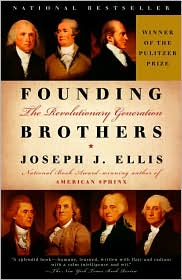Overview
Ellis constructed his book by assessing certain events during the decade following the 1787 Constitutional Convention,
He chooses to do this not in any systematic or comprehensive manner, but by focusing on a half-dozen political personages (John Adams, Thomas Jefferson, George Washington, James Madison, Alexander Hamilton and Aaron Burr) and a handful of revealing episodes that would test their convictions and friendships. [1]
He notes that Ellis borrowed his technique from Lytton Strachey's classic study, Eminent Victorians, about notable English figures.
- Chapter One: The Duel covers the deadly political and personal rivalry between Aaron Burr and Alexander Hamilton, which ultimately led to the Burr–Hamilton duel, which Ellis attributes in part to the passions inflamed by the Revolution. Only a few facts are known about "the most famous encounter of its kind in American history." (pg 20) Burr and Hamilton rowed out to a secluded spot in separate boats and exchanged pistol shots from 10 paces apart. Hamilton was shot in his right side and died.
- Chapter Two: The Dinner explores the secret conversations and negotiations leading to selection of the Potomac River site for construction of the new national capital, in exchange for Virginia's support of Hamilton's plan for assumption of state debts by the federal government.
- Chapter Three: The Silence describes the tacit agreement by the nation's founders to postpone discussion of regulation of slavery in the United States, concluding that any early attempt at abolition would doom the union before it had a chance to become established.
- Chapter Four: The Farewell dissects the Farewell Address of President George Washington, and Washington's views on the best course for the new nation, and a slightly in depth look into some of the views the founding fathers had on issues, such as Jay's Treaty.
- Chapter Five: The Collaborators analyzes two important relationships; the one between John Adams and his wife Abigail during his presidency; and the other between Thomas Jefferson and James Madison during the same time period.
- Chapter Six: The Friendship is devoted to the extensive correspondence between Adams and Jefferson during the last fourteen years of their lives, reviving their lost friendship and expounding on their lives.
This page is based on this
Wikipedia article Text is available under the
CC BY-SA 4.0 license; additional terms may apply.
Images, videos and audio are available under their respective licenses.


